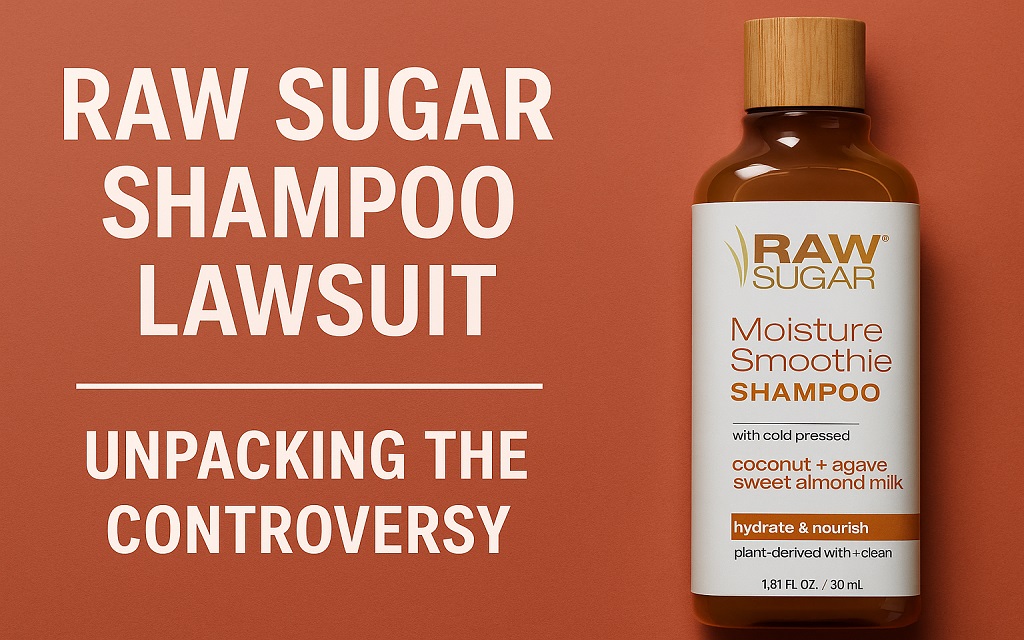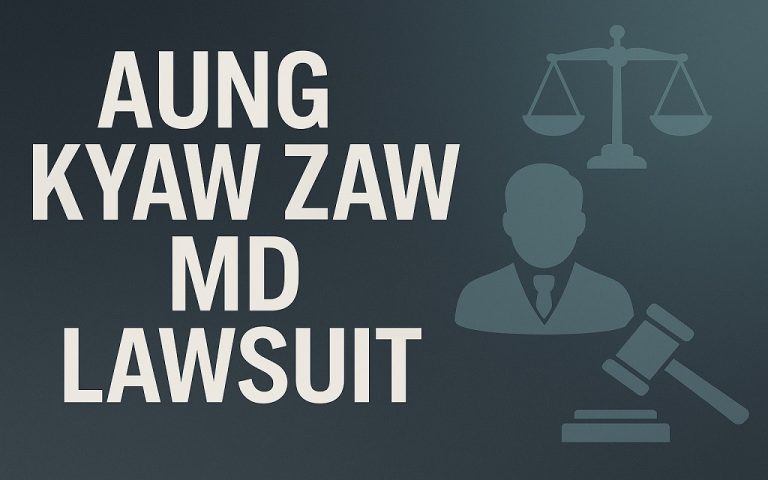The Raw Sugar Shampoo lawsuit has sparked major concerns over product safety and transparency. Allegations claim the brand’s marketing does not align with the ingredients in its products. This article aims to help readers understand the situation, its implications, and what steps they can take.
What Is the Raw Sugar Shampoo Lawsuit?
You must first comprehend the main problem. A Raw Sugar Shampoo Lawsuit has been filed against Raw Sugar Living for allegedly employing fraudulent labelling and misleading marketing. According to customers, the firm markets its shampoos as “clean,” “safe,” and “plant-derived.” The plaintiffs contend that synthetic substances contradict the brand’s promises of natural purity.
Under US consumer protection laws, product fraud is the main issue in this case. Phrases like “naturally derived” and “free of harsh chemicals” are cited in legal filings as possible misrepresentations. If they are not supported by third-party certifications or testing, these statements may violate Federal Trade Commission (FTC) rules.
This issue became more prominent in late 2024. Since then, many watchdog organisations for personal care have voiced worries about the broader ramifications for the “clean beauty” industry.
Why Do Customers Have Concerns?
You should pay attention to growing user reports online. After using Raw Sugar shampoo, customers started writing about brittle hair, itching, and unexpected hair loss. Users began sharing hair care horror stories on Reddit and TikTok. Some even showed before-and-after photos documenting hair thinning.
A 2023 customer review study by TrustPilot noted a 31% increase in negative feedback for Raw Sugar hair products. Reports of scalp sensitivity became a common theme. Most customer reviews indicate that the issues stopped after switching brands.
Despite their “plant-based” claims, many shampoos contain synthetic fragrances, PEGs, and sulfates. Dermatologists often recommend avoiding these ingredients if you have scalp issues. The ambiguity around these additions encourages customer reaction and legal investigation.
What Are the Legal Implications?
You should consider the legal foundation of the case. The plaintiffs contend that Raw Sugar violated state laws protecting consumers, such as the California Unfair Competition Law and the False Advertising Law. These regulations forbid companies from misrepresenting their goods and engaging in dishonest marketing.
The case requests both monetary damages and injunctive relief to compel the brand to alter its labelling procedures. If the court decides in favour of the consumers, Raw Sugar may be subject to millions of dollars in fines or settlements.
Tresemmé was in a similar predicament in 2021, which led to a settlement of millions of dollars. The court determined that promises such as “formaldehyde-free” were deceptive because some components generated formaldehyde when utilised.
Legal experts say a decision against Raw Sugar may change the way clean beauty and natural companies function. Class action status is still pending, but early indications suggest the case may qualify.
How Has Raw Sugar Responded?
You should note that Raw Sugar has publicly denied the allegations. The company insists that all marketing meets FDA labeling requirements and industry standards. On its website, it promotes “Safe for all hair types” and “clean beauty.”
In recent interviews, brand officials cited Aloe vera, shea butter, and coconut oil as evidence of their plant-based philosophy. They did not, however, offer third-party confirmation of the assertions about the origin or complete ingredient safety.
Under current laws, “natural” remains an unregulated term in cosmetics. As a result, businesses can use it even if their products contain processed or synthetic ingredients. However, legal definitions may not match consumer expectations.
What Are Your Rights as a Customer?
You should be proactive in safeguarding the health of your hair and yourself. When purchasing or using shampoo, make sure you follow this checklist:
- Read all ingredients, especially unfamiliar ones
- Research user reviews across multiple platforms
- Avoid products with synthetic fragrances or harsh sulfates
- Consult a dermatologist if you experience scalp irritation
- Document any reactions and contact the manufacturer
- Report adverse effects to the FDA through the MedWatch portal
If you suspect harm, it is essential to keep receipts and packaging. These records may become relevant if a class-action claim allows additional consumers to join later.
Consumers can visit websites like EWG (Environmental Working Group) to check product safety ratings. Apps such as Yuka and Think Dirty also help simplify complex ingredient lists.
Are There Broader Industry Impacts?
You should consider the broader ripple effect on the personal care industry. The Raw Sugar case reflects a growing gap between marketing claims and consumer expectations. Brands in the natural segment now face pressure to deliver promises and verifiable results.
Statista data shows that sales of “natural” shampoos grew by 38% from 2021 to 2024. This growth opened opportunities for smaller brands and influencers to enter the market. However, the lack of strict regulations also allowed greenwashing to thrive.
Due to this litigation, the FDA and FTC may redefine terminology like “plant-based” and “clean.” This may compel companies to provide testing, third-party certifications, and transparent disclosures to support their claims.
Target and Whole Foods may also update their stocking policies to avoid liability. Consumers trust these outlets to vet the brands they promote, and legal exposure could change how distributors evaluate personal care products.
Is Raw Sugar Still Safe to Use?
You should understand that no formal recall has been issued. The FDA has not yet flagged Raw Sugar products as unsafe. However, the absence of a recall does not imply complete safety for all users.
You are advised to discontinue the product if you notice adverse side effects. In addition to seeking medical advice, you can use the FDA’s Consumer Complaint System to make a formal complaint.
A patch test is also a smart step before using any new hair product. Apply a small amount to the inner wrist and wait 24 hours. Look for redness, itching, or swelling. That method helps you detect early reactions.
It is wise to stay updated on the lawsuit’s progress. Court documents or official statements will provide more precise guidance over time.
What Happens Next in the Legal Process?
You should expect several steps in the lawsuit’s lifecycle. Here’s a basic outline:
- Discovery Phase: Lawyers gather documents and internal records
- Certification Hearing: The Court decides if the case qualifies as a class action
- Trial or Settlement: Brand may settle or proceed to trial
- Compensation Phase: Eligible consumers may file claims
Legal timelines vary. The process could take months or years, depending on evidence, appeals, and negotiations. Following updates through court trackers or legal news outlets will keep you informed.
If class certification occurs, you may become eligible to join the lawsuit. Legal websites or law firms often post claim forms or eligibility tools once a class action is approved.
How Does This Affect Other Beauty Brands?
You should consider the signal this sends to the broader market. If the court penalizes Raw Sugar, it will set a precedent to push other brands to revisit their marketing, ingredients, and consumer disclosures.
Recent data from Mintel shows that 62% of U.S. consumers now prefer products labeled “non-toxic” or “eco-friendly.” Yet only 28% say they fully trust those claims.
To reduce risk, brands may start:
- Partnering with third-party testing labs
- Getting EWG Verified or USDA Organic certifications
- Creating ingredient transparency dashboards
- Hiring legal teams to vet marketing language
Regulation is likely to evolve quickly. Brands that adapt now can avoid legal pitfalls and maintain customer trust.
Final Thoughts
You should stay aware of lawsuits like the Raw Sugar Shampoo Lawsuit. These stories remind consumers to read labels, question claims, and document their experiences. Trust is vital in personal care, and brands must match their marketing with facts.
It is crucial to protect your hair, your health, and your right to truthful information. Follow legal updates and take action if necessary.
Must Read: OGX Lawsuit: What You Need to Know About Hair Loss Claims
Musarat Bano is a content writer for JudicialOcean.com who covers lawsuits, legal news, and general legal topics. Her work focuses on research-based, informational content developed from publicly available sources and is intended to support public awareness. She does not provide legal advice or professional legal services.




